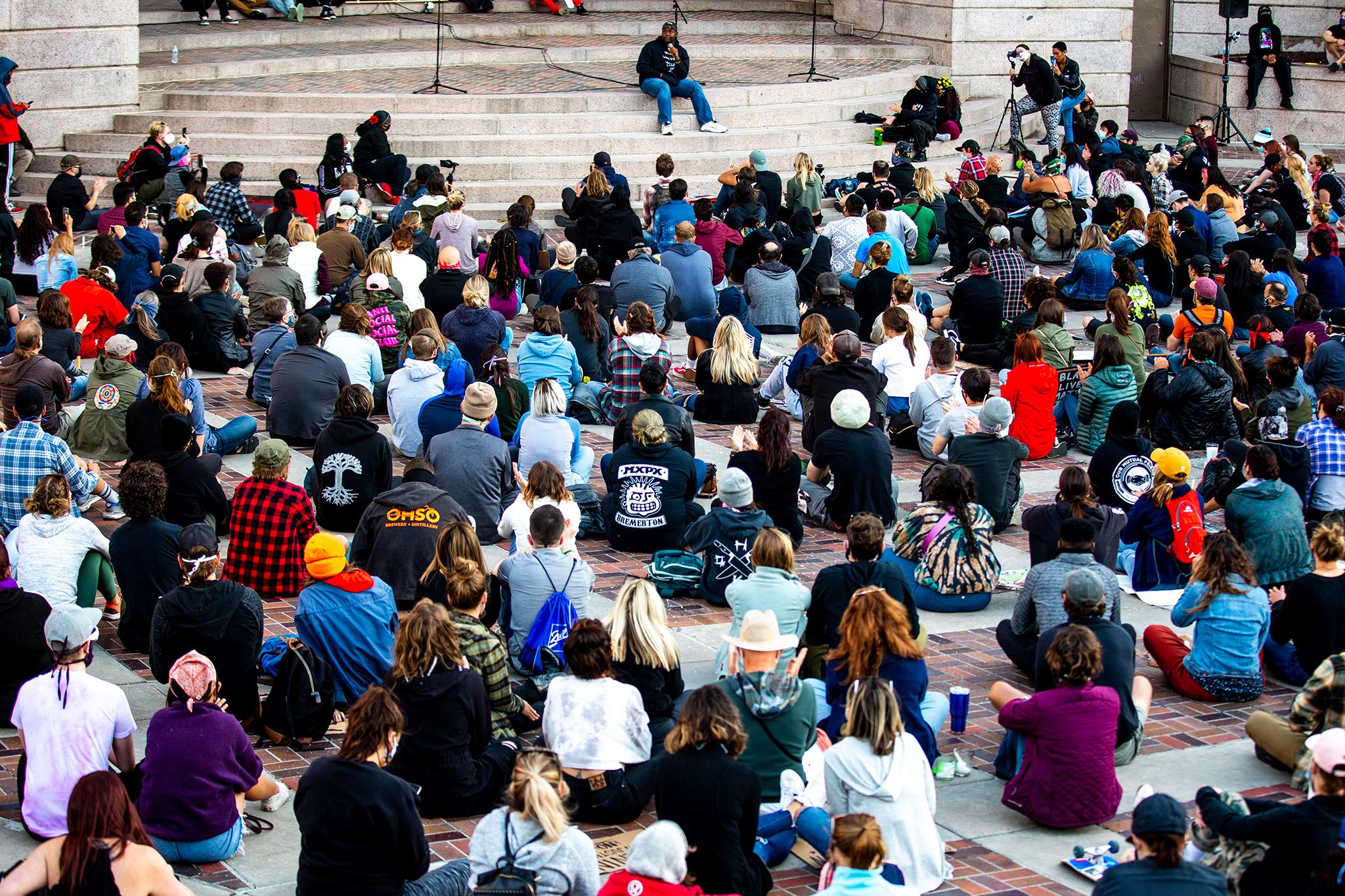The retired commander who oversaw the Denver Police Department's response to protests in the wake of George Floyd's murder testified this week that he didn't agree with the way officers deployed use of force against demonstrators in certain incidents.
Patrick Phelan, who retired from the department in 2020, made the comments as part of a federal civil rights trial underway in Denver. A group of a dozen protesters is seeking money and policy change in response to injuries and alleged First Amendment violations carried out by DPD. It's the first protest case in Colorado to make it to trial.
Phelan faced questions from plaintiffs' attorneys about a viral video of officers shooting pepper balls at a man while he was standing outside of his car at the intersection of Colfax Avenue and Lincoln Street near the state Capitol. In the video, dated May 30, the man is seen yelling at police officers while his pregnant girlfriend sits inside.
"You shot a car with a pregnant woman in it," the man yells at a line of officers.
The officers then fire multiple rounds of pepper balls at him as he continues to scream that his pregnant girlfriend is sitting inside, video shows.
"I didn't like the application. It shocked me," Phelan said about the video during his testimony.
Still, Phelan said that officers acted in line with the department's use of force policy.
"It was consistent because [officers] were asking him to move and comply with their orders," Phelan said. "They could authorize or deploy pepper balls. I wouldn't have done it. I don't like the way it looked. But it was still in policy."

The second week of the trial has featured testimony from several members of the department, and Phelan's testimony was similar to other officers' defense of their actions during the protests. They argued their actions were within policy and necessary due to the chaotic nature of the protests, which took place over several weeks in late May and early June 2020.
During questioning this week, city attorneys attempted to depict a police department doing its best to protect public safety, highlighting several incidents of concern, including a series of gunshots fired near the Capitol building grounds. In another exchange, a city attorney played video of protesters blocking traffic on Interstate 25 and throwing rocks at officers who were trying to clear the highway.
"I never saw more abuse towards police officers in my 40 years [as an officer]," Phelan said about the protests. "Not only the language, but the physical abuse. I've never seen it like that."
The ongoing trial is unique in that it's the first time Phelan and other officers have publicly spoken at length about their response. The city has already settled similar excessive force lawsuits brought by injured protesters. Last month, Denver City Council unanimously approved settlements with two protesters without going to trial. Denver has spent more than $1.3 million settling claims to date.
Plaintiffs' attorneys focused their questioning on instances where department policy wasn't followed, trying to prove that mismanagement at the department's top levels contributed to their clients' alleged First Amendment violations. Plaintiffs in the case argue they were shot, tear-gassed and stopped from exercising their First Amendment rights while peacefully protesting and that officers should have been able to distinguish between them and violent demonstrators.
In one line of questioning, Elizabeth Wang, one of the plaintiff's attorneys, asked Phelan why the department often failed to record dispersal orders in writing, even though policy requires them to notify people before using less-lethal force. Phelan said officers communicated those orders through radio or phone to him, rather than writing, due to the fast-changing nature of the demonstrations. Many officers were working 12- to 16-hour shifts and simply didn't have time, Phelan said.

"It was just a hectic time," Phelan said. "It wasn't done like it should have been done, and that's our error."
In addition to Phelan, three other officers were also called to testify this week, including Jonathan Christian, who worked evening and overnight patrol shifts during the demonstrations.
Christian waited until June 8, 2020 to fill out required use of force reports, which was 11 days after the start of the protests, according to his testimony. The daily reports are required under department policy to justify use of pepper balls and other weapons to control crowds.
"We were told (by supervisors) that we would have to fill out a use of force report," Christian told Tim Macdonald, one of the plaintiffs' attorneys. "But we wouldn't have to worry about our statements until everything had calmed down."
"And maybe you didn't capture every use of force because a lot had happened from May 28th to June 8th," Macdonald said. "Is that fair?"
"Yes, sir," Christian said.
Macdonald played recordings of one of the unreported incidents, captured by one of the plaintiff's cell phones. The video showed Christian kneeling on the state Capitol grounds, firing a pepper ball round at Elisabeth Epps, a plaintiff, while she was peacefully protesting in the street .
Christian shot at her "for her own safety," he said, adding that he noticed a car had honked at Epps and he wanted to clear her and others from the street.
"Was that consistent with your training?" Macdonald asked.
"Yes sir," Christian said.
"Consistent with DPD policy?"
"Yes, sir."
"[Were you] disciplined for any of the times in which you shot at citizens while being in the street for 'their own safety?'"
"No, sir."

Nick Mitchell, the city's former independent monitor, took the stand Thursday to testify about his office's scathing review of how DPD treated protesters. The investigation found that the department violated its own policies and endangered people while leaving a scant paper trail.
One of the key themes Mitchell found during interviews with officers was a concern about a lack of crowd management training leading up to the protests. Many officers also felt confused about what supervising officers wanted from them in real-time.
"Officers did not have a clear sense of their tactical objectives when they were on skirmish lines," Mitchell said. "Should they advance? Should they hold ground? Should they cede territories to protestors or attempt to engage, um, physically with protestors? There was a lack."
The confusion led to more injuries to protesters as well as officers, his report concluded.
"I heard that from several officers in the DPD," Mitchell said.
Mitchell's report relied heavily on one-on-one interviews with officers and video taken by street cameras and protesters because the department lacked a specific policy requiring officers to use body cameras during protests. The footage gap was one example of the department's lack of transparency in its response, he said.
"I think knowing that you're being recorded may have a significant impact on the kinds of force that officers are willing to use and the kinds of violence citizens might use towards officers," Mitchell said.
On Thursday, plaintiffs' attorneys entered a series of previously confidential memos from Mitchell's investigation into evidence. The documents included summaries of conversations with top DPD commanders, who said the department suffered a total "leadership failure" amid the protests.
Cpt. Sylvia Sich, who worked in the department's main command center, said Chief Paul Pazen appeared "over his head" and was often "angry and paralyzed" during the protests.
Pazen would often give direction to Phelan without having complete information about the situation on the ground, according to the summary. He would then "lose it" when presented with differing opinions, Sich said.
DPD declined to comment on the memos, citing the ongoing trial.
Other leaders criticized Pazen for not prioritizing crowd management training leading up to the protests.
Lt. John Coppedge, who works in the department's training academy, told Mitchell "the prevailing attitude is that training is not important," according to one of the memos.
During the protests, supervisors failed to recognize when on-the-ground officers had taken too much abuse from protesters, Coppedge said.
"Tempers and clarity of mind would run short, and the result was the overuse of pepper balls," he said.
The trial is expected to last up to another week. Both sides are expected to call additional witnesses, plaintiffs and law enforcement experts.
This story has been updated.












